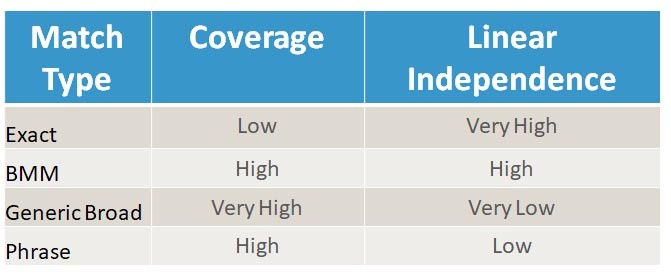To the tune of Taylor Swift’s song.
It has been some time that I wanted to sit down and write this post. I cringe every time I see incorrect use match type in a client’s account.
As of today you can choose from four type of match types:
- Exact
- Broad Modified Match (BMM)
- Generic broad
- Phrase
Care to guess which ones are ok and which are not?
Explaining this concept to my clients, I always like to do a small exercise of the imagination. It goes somewhat like this: imagine a car. This car is similar to any other car but the difference is each time you press on the gas pedal, the windshield wipers begin working. Every time you hit on the breaks the right doors open. Each time you signal left or right, your car seat reclines. Now imagine trying to drive this imaginary car on your daily commute from home to work. Yes, it will drive you crazy!
Managing and trying to optimize an account with most of the keywords are generic broad or phrase match is like driving that car.
So now you know that Exact and BMM match types are ok, the other two, not so much.
So the begging questions is why?
There are two major concepts on selecting keyword match type, coverage and linear independence.
Coverage is the ability of having a small set of keywords that cover an important amount of user search queries of the interested category you compete in. Coverage is lowest with Exact match as the probability to match a certain user search query is lower than other types of matches. In the other extreme, the Generic Broad has the highest coverage. However, this high coverage comes at a price. A very steep price indeed as you will see below, the price is low independence.

Linear independence is the ability for one keyword of behaving independently of other keywords in the same account. We can think of it as low interdependence or low cannibalization of searches between each keyword. For those of you that remember some algebra, it is similar to the concept of avoiding the co-linearity of vectors. Now, keywords and semantic objects are not vectors. However, organizing an account as clean as possible is the first step to been able to optimize the account in the future through keyword bidding.
Why then do broad generic keywords have low independence? And why should it matter? There two main problems with broad generic keywords:
1) Not all the keywords needed to be present in the query to activate the match. What we call the partial match.
2) Google allows the use of synonyms on broad generic.
This generates many search queries that may not be aligned to your business offerings or there is a lost opportunity of handling a generic keyword as a mixed bag of intentions. Let’s take one example from the auto industry. One might say that the adjective “used” car and “pre-owned” car means the same and Google might interpret them as synonyms. However, I can tell you from experience that keywords +used +car and +pre +owned +car do not behave the same. For a used car classifieds site, generally, the “pre-owned” term usually has a higher conversion rate. Because of this conversion rate difference, it is important to have these terms separated using BMM structure instead of a generic match type. This will allow to bid separately for each term optimizing the account better.
So remember, every time you use a generic broad match a SEM fairy dies. Joking aside, I recommend using a mix of 5%/10% exact match keywords and 90%/95% BMM keywords.
Think about building a good structure and keyword base for account optimization through keyword bidding.
Happy bidding.

